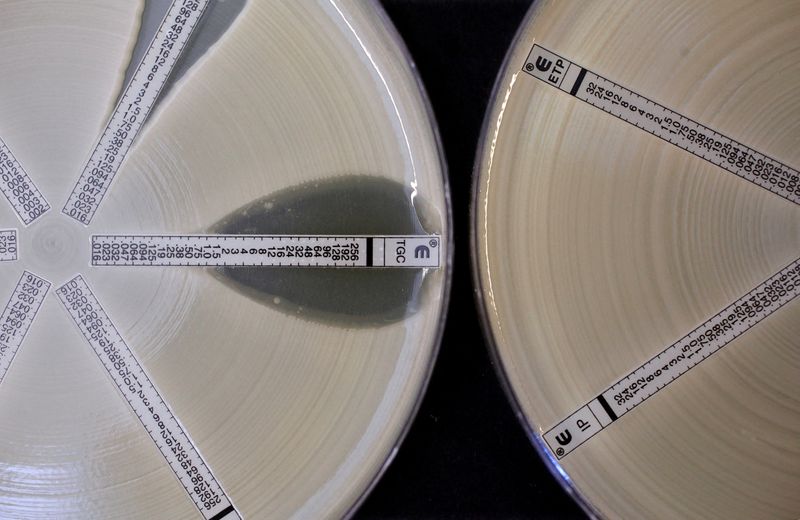By Natalie Grover
LONDON (Reuters) -Increased drug resistance in bacteria causing bloodstream infections, including against last-resort antibiotics, was seen in the first year of the coronavirus pandemic, a World Health Organization report based on data from 87 countries in 2020 showed.
The overuse and/or misuse of antibiotics has helped microbes to become resistant to many treatments, while the pipeline of replacement therapies in development is alarmingly sparse.
High levels (above 50%) of resistance have been reported in bacteria that typically cause life-threatening bloodstream infections in hospitals such as Klebsiella pneumoniae and Acinetobacter spp, report authors highlighted on Friday.
These infections often require treatment with 'last-resort' antibiotics, drugs that are used when all other antibiotics fail.
About 8% of bloodstream infections caused by Klebsiella pneumoniae grew resistant to a vital last-resort group of drugs called carbapenems, the report said.
Rates of antimicrobial resistance (AMR) remain very high, but last-resort antibiotics are only just starting to lose potency, said Dr Carmem Pessoa-Silva, the lead for WHO Global Antimicrobial Resistance Surveillance System, in a media conference.
The message of hope, she said is, "we have a very narrow window of opportunity...for responding to the threat."
While there is a concerted push to limit the unbridled use of antibiotics, the pace of new research remains grim.
The effort, cost and time it takes to get an antibiotic approved and the limited return on investment have deterred drugmakers, as treatments must be priced cheaply and are designed to be used as little as possible to limit drug resistance.
As a result, the lion's share of antibiotic development is taking place in a handful of labs of small biopharma companies as a majority of their larger counterparts focus on more lucrative markets.
Only a few big pharmaceutical companies remain in the space — including GSK and Merck — down from more than 20 in the 1980s.
A landmark global analysis published earlier this year found that 1.2 million people died in 2019 due to antibiotic-resistant bacterial infections, making AMR a leading cause of death worldwide, higher than HIV/AIDS or malaria.
"Political commitment (on AMR) must now urgently move from aspiration into action," said Thomas Cueni, director general at International Association of Pharmaceutical Manufacturers and Associations.

The authors of the WHO report said more research is needed to identify the reasons behind the jump in AMR in the period studied, and to what extent it is linked to the accelerated use of antibiotics during the pandemic.
AMR rates also remain difficult to interpret due to insufficient testing and weak laboratory capacity, particularly in low- and middle-income countries, the authors wrote.